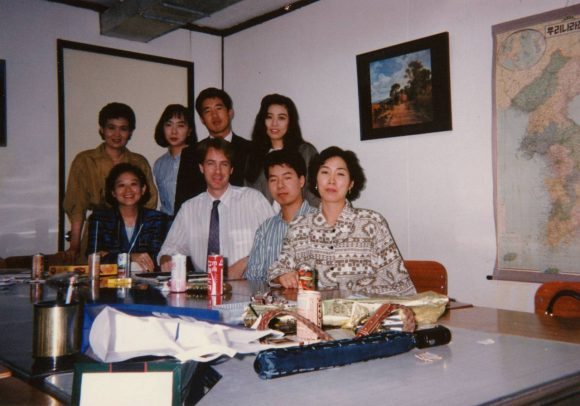Korea 022 – Student Nicknames
In spite of their bizarre ways, my inability to adapt and the resulting trauma, I became very fond of my students and Korea. It was like being faced with a child so obstinate and so aggravating that you just had to laugh. And through laughter liking grows.
Sometimes my students even surprised me with a flash of imagination, but predictably it was always in a very extreme way that I never would have expected. Koreans were never ones for doing anything halfway. When they did something, they DID it. And if it was something weird, it was WEIRD. One such case is the use of names.
I never could master their names. In trying to establish an informal environment, I initially tried to memorize all their given names. Koreans have three names: their family name, a generation name and a given name. Routinely, the family name came first and then the generation name and finally the given name as in Kim, Eun Joo or Park, Young Min. To begin with, names were a touchy thing in Korea and had to be used in the proper and polite way if at all. But foreigners could get away with many things that Koreans couldn’t, and I resolved to use their given names. But no matter how hard I tried, I couldn’t. The combination of trying to remember the sounds, which had no meaning for me, and applying them to faces that I couldn’t distinguish (especially in the case of salarymen) and having those faces change every 30 days was too much. I soon tired of continually embarrassing myself by asking again for someone’s name.
The next best option was to use the Western convention of Mr. Mrs. and Miss, which had come into common use in business circles in Korea. But there was a catch here as well. To the foreigner, the entire population appeared to have the names Kim, Park, or Lee. In fact, these three probably account for 50% of all names. One memorable class of fifteen students that I taught all had the family name Kim. In one way, it made things very easy. “Well, Mr. Kim what do you think? And Mrs. Kim? What about you Mr. Kim? Mr. Kim, do you agree?” In other ways, it complicated matters. I found it impossible to keep attendance, and the constant use of Mr. and Mrs. threw a blanket of formality over the class that it never recovered from.
The solution was English nicknames. Most teachers used nicknames for all their students and one of the tasks of Introduction Monday was to have the students choose a nickname or have one assigned to them by their classmates or by the teacher. I expected them to choose sensible English names like Bill or Bob or Mary, but I underestimated both their strangeness and the extent to which Western culture had arrived in Korea. Some students chose celebrity names such as Madonna or Clint Eastwood. Others chose fantasy figures such as the Incredible Hulk, Superman, or The Destroyer. A few chose titles, such as Mr. President, General or The Dictator. Some classes went for a theme. My personal favourite was the class that chose virulent diseases. The students were known as Malaria, Diptheria, Cholera, Leprosy and The Plague. I didn’t try and understand it. These names I could remember!
My students surprised me in other ways. The first month, I was sure all my students hated me. I had adopted the hard boiled approach and had ridden them pretty hard. Every day, I endured moans and groans and glaring eyes and uncooperative silence. It was a war environment. I returned to the Inn Sung Do each night at my wit’s end dreading the coming of another day. I planned on working just this month, maybe one more and then getting out of this weird country.
But then on the final day of classes, I was given a party and showered with presents. They told me I was their favourite teacher and they appreciated my sincerity. I learned later that they said this to every teacher and that every teacher was given presents. But that didn’t matter. Who can resist presents and flattery?
Presents are a large part of Korean societal give and take. And teacher/scholars being at the top of the Confucian totem pole, we received many gifts. The final day of classes usually produced presents, as did “Teacher’s Day” (the fifteenth day of the fourth lunar month), my birthday, Valentine’s Day, White Day, Chusok (Korean Thanksgiving), and Christmas. But (there is always a but in the life an English teacher) the gifts had that peculiar Korean touch. They were either quite strange and inappropriate, such as a car air freshener for a person who didn’t own a car, or they reflected a Korean utilitarianism. Heading the list of most common gifts were white socks followed closely by handkerchiefs, hand soap, laundry soap, and at Chusok, gift packs of spam. Teachers were also given underwear and every imaginable gaudy tourist oriented trinket. The tried and true Western concept of “it’s the thought that counts” never applied more. Middle school and high school girls often developed crushes on their teachers and shyly handed over cassettes of favourite love songs with a pointed “I like you” penciled on the cover.
Tags: Korea, Korea - First Days Teaching English, Teacher Day, Valentine Day, White Day

